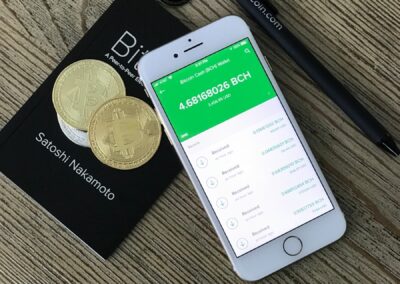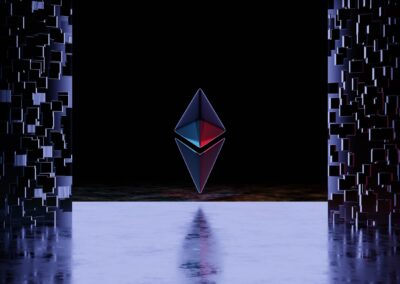Transforming Digital Economies through Blockchain Technology
Understanding Play-to-Earn Models and Virtual Currencies
The use of virtual currencies in play-to-earn models is revolutionizing the way users engage with games and other activities within the metaverse. These models allow participants to earn real income by playing games, creating content, and participating in various virtual activities. In regions like Saudi Arabia and the UAE, where digital innovation is highly encouraged, the integration of virtual currencies with play-to-earn models is unlocking new economic opportunities and transforming the digital landscape.
Play-to-earn models leverage blockchain technology to create decentralized and transparent economies within virtual environments. Players can earn virtual currencies by achieving in-game milestones, trading virtual assets, and contributing to the virtual community. These earned currencies can then be exchanged for real-world value, providing users with tangible financial benefits. For instance, in cities like Riyadh and Dubai, where the adoption of blockchain technology is rapidly growing, play-to-earn models offer a novel way for individuals to monetize their digital skills and creativity.
Moreover, the integration of virtual currencies in play-to-earn models fosters a sense of ownership and investment among players. Unlike traditional gaming models, where virtual assets are owned and controlled by game developers, blockchain-based play-to-earn models give players true ownership of their digital assets. This decentralized ownership model empowers players, enabling them to freely trade, sell, or utilize their virtual assets across different platforms and metaverses.
The Economic Impact of Play-to-Earn Models
The economic impact of play-to-earn models is profound, particularly in regions like Saudi Arabia and the UAE, where there is a strong emphasis on economic diversification and digital transformation. By enabling users to earn income through virtual activities, play-to-earn models create new revenue streams and economic opportunities that can significantly contribute to the digital economy.
One of the key benefits of play-to-earn models is the ability to provide income opportunities to a wide range of individuals, including those who may not have access to traditional employment. For example, in the metaverse, artists can create and sell digital art, developers can build and monetize virtual experiences, and gamers can earn rewards through gameplay. This democratization of income opportunities can help reduce economic disparities and foster inclusive economic growth in regions like Riyadh and Dubai.
Additionally, the rise of play-to-earn models is driving the development of new business models and industries. Companies are increasingly exploring ways to integrate play-to-earn mechanisms into their digital offerings, creating innovative products and services that cater to the growing demand for virtual economies. This trend is particularly evident in the gaming industry, where developers are leveraging blockchain technology to create decentralized games that offer real-world rewards. In dynamic markets like Saudi Arabia and the UAE, businesses that embrace play-to-earn models can gain a competitive edge and drive long-term growth.
Challenges and Future Prospects of Play-to-Earn Models
Despite the promising potential of play-to-earn models, there are several challenges that must be addressed to ensure their sustainable growth and success. One of the primary challenges is ensuring the security and integrity of virtual currencies and blockchain networks. As play-to-earn models involve real financial transactions, they are susceptible to cyber threats and fraud. Implementing robust security measures and ensuring compliance with regulatory standards are essential to protect users and maintain trust in the system.
Another challenge is the volatility of virtual currencies, which can impact the stability and predictability of earnings for players. Virtual currencies are subject to market fluctuations, and their value can change rapidly. To mitigate this risk, developers and platform operators need to implement mechanisms that stabilize the value of virtual currencies or provide users with options to convert their earnings into stable assets.
Furthermore, the scalability and interoperability of blockchain networks are critical factors for the success of play-to-earn models. As the number of users and transactions increases, blockchain networks must be able to handle the growing demand without compromising performance or security. Developing scalable solutions and ensuring interoperability between different platforms and metaverses are key to creating a seamless and integrated virtual economy.
Looking ahead, the future prospects of play-to-earn models are bright, with ongoing advancements in blockchain technology and increasing adoption of virtual currencies. Innovations such as decentralized finance (DeFi) and non-fungible tokens (NFTs) are expected to further enhance the functionality and value of play-to-earn models. For instance, DeFi protocols can enable players to lend, borrow, and invest their virtual currencies, creating new financial opportunities within the metaverse. NFTs can provide unique and verifiable ownership of digital assets, adding value and rarity to in-game items and virtual experiences.
Driving Business Success through Play-to-Earn Models
Implementing play-to-earn models in the metaverse can drive significant business success by enhancing user engagement, creating new revenue streams, and fostering innovation. For businesses in Saudi Arabia and the UAE, leveraging play-to-earn models can provide a competitive edge and open up new opportunities for growth and diversification.
One of the key benefits of play-to-earn models is their ability to attract and retain users by offering real financial incentives. By enabling users to earn income through virtual activities, businesses can increase user engagement and loyalty. This can lead to higher retention rates, increased user activity, and a larger user base, driving overall business success. In competitive markets like Riyadh and Dubai, where customer experience is a critical differentiator, play-to-earn models can be a powerful tool for attracting and retaining customers.
Moreover, play-to-earn models can support the development of leadership and management skills by providing users with opportunities to manage virtual assets, make strategic decisions, and collaborate with other players. These skills can be valuable in the real world, enhancing the personal and professional development of users. For businesses, supporting the development of these skills can contribute to a more skilled and capable workforce, driving long-term success and competitiveness.
Furthermore, the integration of play-to-earn models with executive coaching services can provide valuable insights and support for business leaders. By analyzing user behavior and engagement within play-to-earn models, businesses can gain insights into market trends, customer preferences, and potential areas for innovation. This data-driven approach can support strategic decision-making and help business leaders identify new opportunities for growth and success in dynamic markets like Saudi Arabia and the UAE.
Conclusion
In conclusion, the integration of virtual currencies in play-to-earn models is revolutionizing the metaverse by creating new economic opportunities and enhancing user engagement. Despite the challenges, ongoing advancements in blockchain technology and increasing adoption of virtual currencies are driving the growth and success of play-to-earn models. For businesses in Saudi Arabia and the UAE, leveraging play-to-earn models can provide a competitive edge, drive innovation, and support long-term growth and success. By embracing this technology, businesses can create unique and engaging digital experiences that resonate with users and drive business success in dynamic and competitive markets like Riyadh and Dubai.
—
#VirtualCurrencies #PlayToEarnModels #Metaverse #Blockchain #ArtificialIntelligence #BusinessSuccess #Leadership #ManagementSkills #SaudiArabia #UAE #Riyadh #Dubai























